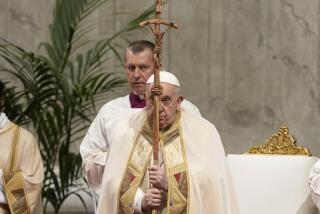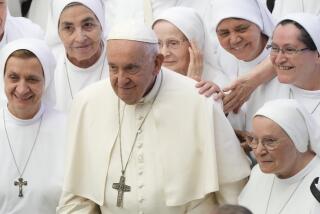The Pontiff’s Moral Obligation for Justice
- Share via
JERUSALEM — Politically, Pope John Paul II’s visit to the Holy Land comes at a moment of truth in the negotiations for a permanent peace in the Middle East. The five-year interim period of the Oslo accords has been completed with some of the agreed-upon clauses still unfulfilled. But now the hard part has commenced. Intensive Palestinian-Israeli negotiations are taking place this week near Washington, D.C. with the hope that a breakthrough can be reached on such difficult issues as borders, settlements, economic relations, refugees and Jerusalem.
While the pope will certainly not be making any substantive input regarding the specifics of the negotiations, as the head of the Roman Catholic Church he has a moral obligation to address the political issues that have been delaying the implementation of peace in the region.
As part of the pontiff’s position, he is certainly going to deal with the issue of peace and justice. While politicians might be dealing with peace from the position of realpolitik, the pope can make a strong moral position regarding the need to integrate justice in any peace agreement.
Specifically, the people of the region are expecting the pope to deal with the issues of Jerusalem and refugees. The Christian church of today can’t be expected to be neutral about the status of the city in which the first church started. There is no doubt that the Catholic church, represented by its leader, is concerned about the holy places in Jerusalem, the Christians of Jerusalem as well as the access of Palestinians to the holy city. Despite Israeli attempts to exclusively control the city and deny other parties from having a say in its future, the church has much to say on this score. Agreements by the Vatican signed by the state of Israel and the PLO have certainly improved the ability of the church to try to influence the results of the talks on the future of Jerusalem.
The church and this pope in particular also have a moral say regarding the plight of Palestinian refugees who were forced to leave their homes in 1948 and have been denied ever since the right to return--despite repeated U.N. resolutions. The visit by the pope to the Dahaisha refugee camp near Bethlehem will indicate his concern that the right of return for the Palestinian refugees be addressed justly.
The visit of the Holy Father to Jordan, Palestine and Israel also must include an attempt to improve the fragmentation of the faithful in these holy lands. His eminency can certainly contribute to the attempts at unifying the Christian Church as well as attempts to bring interfaith dialogue to a much higher and more effective level.
Before making his Holy Land pilgrimage, the Holy Father made a dramatic and genuine plea for forgiveness for the church. Despite some Jewish and Israeli skeptics, the plea has not fallen on deaf ears. In fact, some have responded by asking present-day political leaders to follow the pontiff’s lead and ask forgiveness for the sins that have been committed against the people of the Middle East. The people of the Holy Land, who have seen so much pain, exile, discrimination, house demolition, freedom restrictions, torture and death--all in the name of religion--hope that this major religious leader can help reverse this trend. They look to the pope to help begin the healing process. If such a healing and reconciliation process is to work, it must be based on truth and justice.
More to Read
Sign up for Essential California
The most important California stories and recommendations in your inbox every morning.
You may occasionally receive promotional content from the Los Angeles Times.










